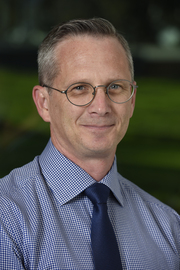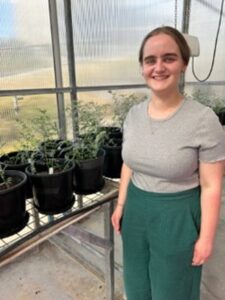Welcome to the February 2025 Phytogen!
In this issue, we formally welcome Professor Brent Kaiser as our new ASPS President and express our gratitude to Professor Martha Ludwig for her outstanding leadership for the last 2 years. Applications for several ASPS awards are now open. We also introduce the final student representatives of the Society for the year. This month our student contributor is Francis Kuang, a final-year PhD student at the University of Melbourne.
We welcome contributions from students and researcher at any time for publication in Phytogen and on our social media sites. Its free and a great way to give your research profile a boost and share your findings! Send your contribution to our editors Raz (razlin.azman@csiro.au) or Lucas (L.Auroux@latrobe.edu.au).
The new ASPS website is currently underway, and we need your contribution! Send us your plant science-related research photos to be featured on the new website. For copyright reasons, please do not send any images that have been published or that you are planning to publish. Images for consideration for the new website can be sent to Phytogen editors or Janet Wheeler.
ASPS Leadership Transition
 Thank you Prof Martha Ludwig!
Thank you Prof Martha Ludwig!
As we begin 2025, we bid farewell to Professor Martha Ludwig as ASPS President. During her tenure, Martha has been instrumental in strengthening the connections between states and territories, enhancing the visibility of Australian plant science research, and fostering a more inclusive scientific community. Her leadership has been particularly crucial in navigating the post-pandemic landscape and establishing robust hybrid conference formats that have increased accessibility and participation across the country. Martha will continue to contribute to the Society’s executive committee, ensuring a smooth transition and continued strategic guidance. We have asked Martha to say something about her time as ASPS President
Dear ASPS Members,
It was a pleasure for me to be President of our Society for the last two years – wow, did that time fly! High points of my time as President certainly include ASPS 2023 in Hobart and our hybrid meeting last year. The work of the ASPS membership in organising and attending these meetings was amazing and reflects the collegiality of our members and the strength of our society. Interactions with members of the ASPS Executive; Discipline, Diversity and Inclusion, and Student Representatives; and the Website and Communications Team are also high on the list of enjoyable experiences. I thank all for their enthusiasm, insights, input, time, and dedication to ASPS and plant science. I am pleased that conversations with Functional Plant Biology and Annals of Botany initiated several new and exciting opportunities for ASPS early- and mid-career researchers to extend and expand their research networks. Similarly, continued ASPS involvement with Science Technology Australia and Global Plant Council offers ASPS members chances to highlight and promote Australian plant science. It is great to see ASPS members engaging with these entities through webinar programs and sponsored events such as Science Meets Parliament. Developing closer ties between ASPS and the New Zealand Society of Plant Biology have also been enjoyable and hopefully will become stronger and perhaps expand to other Pacific Rim countries. I also look forward to the upcoming launch of the new ASPS website. From speaking and corresponding with ASPS members at all career stages, I believe the Society has a very positive future. The importance of plant science has never been greater. From climate change to food, fibre and fuel security, to synthetic biology, understanding how plants work is crucial. And as we know, fun! I will continue my involvement with the Society and welcome ideas on how ASPS can continue to support our membership and communities – just email me! I wish our new President, Brent Kaiser, all the best and I hope he enjoys the role as much as I did.
Best wishes to all,
Martha
Welcome, Professor Brent Kaiser!
We are delighted to welcome Professor Brent Kaiser as our new ASPS President.
Professor of Legume Biology,
School of Life and Environmental Sciences,
Director: ARC ITRH – Legumes for Sustainable Agriculture,
The University of Sydney (NSW)
Dr. Brent N. Kaiser is the Professor of Legume Biology and Molecular Genetics in the School of Life and Environmental Sciences at the University of Sydney, Australia. Brent is originally Canadian who migrated to Australia in 1994 to complete a PhD at the Australian National University (ANU) in Canberra under the supervision of Prof David Day. Prior to coming to Australia, he completed a BSc (Agriculture.) and MSc (Plant Physiology), at the University of Guelph in Guelph Ontario. He has worked as a postdoctoral fellow in France (Sophia Antipolis, Nice), Canada (UBC) and Australia (ANU). He arrived at the University of Sydney in 2015 and prior to that a teaching/research academic at the University of Adelaide (2003-14).
Professor Kaiser’s research focus is on nitrogen nutrition in plants. His research group examines the genetic and biochemical mechanisms by which plants access, assimilate and redistribute nitrogen across their developmental life cycle. The research involves the use of a range of model systems that include, symbiotic nitrogen-fixing legumes (Chickpea, Soybean, Medicago) and cereals (maize and wheat). Across both programs, the research aims to deliver genetic-based traits, which enhance nitrogen utilization, and which contributes to improved plant health, productivity and sustainable nitrogen use qualities of Australian cropping plants. He was the Director of the ARC Industrial Transformation Research Hub – Legumes for Sustainable Agriculture (2016-20) and recent director of the Sydney Institute of Agriculture (2022-24). Recent research activities have been focussed towards value-added outcomes for pulse crops (plant protein foods) and exploring fibre-based crop production systems for Australia and Namibia (Agave, Kenaf and industrial Hemp) for biofuels and enhanced plant-based fibres. Prof Kaiser is currently establishing an Australian farmer cooperative (Cobbedee) to establish a seed company that will commercialise new hybrid bread wheat technologies in Australia, a discovery initially developed by the University of Sydney’s, Plant Breeding Institute. Brent is the co-director (2024-) of the recently established International Joint Centre for Food Security and Sustainable Agriculture between the University of Sydney and Peking University (China).
Professor Kaiser has been a longstanding member of the Australian Society of Plant Scientists, which initiated during his PhD at the ANU (1995-99). He previously served as Treasurer of ASPS (2014-16). Brent is an avid plant scientist and plant admirer. An active home gardener in Camden NSW. Gardening became an interest, which kicked off early in his life, when maintaining private gardens back on Thetis Island, British Columbia, Canada – the starting point to this exciting life journey.
ASPS Award Applications now OPEN
We are pleased to announce that applications are now open for several prestigious ASPS awards: Jan Anderson Award, Peter Goldacre Award, Teaching and Outreach Award, and RN Robertson Travelling Fellowship. Winners of the Peter Goldacre, Jan Anderson and Teaching and Outreach Awards will present at the annual Conference later in the year
Application Deadline: 4th April 2025
For detailed information and application guidelines, see the following links
ASPS Teaching and Outreach Award
RN Robertson Travelling Fellowship
ASPS Student Representatives
Katie Schleyer, Flinders University, Adelaide (SA)
katie.schleyer@flinders.edu.au
“I am a PhD student with a background in molecular biology and an ever-growing collection of succulents. My project focuses on the alternative oxidase plant gene family, which encodes enzymes involved in respiration, and their potential role(s) in growth, reproduction, and stress tolerance in legumes.”
 Alistair Hockey, University of Western Australia (WA)
Alistair Hockey, University of Western Australia (WA)
alistair.hockey@research.uwa.edu.au
“I am a PhD candidate at the University of Western Australia deeply interested in genetic factors that mediate gene flow and drive evolutionary change. My research focuses on post-zygotic barriers in Cicer echinospermum P.H. Davis using cytogenetics, bioinformatics, and reproductive phenotyping to identify, characterize and validate these barriers.”
 Juel Datta, Centre for Agriculture and the Bioeconomy, QUT, Brisbane (Queensland)
Juel Datta, Centre for Agriculture and the Bioeconomy, QUT, Brisbane (Queensland)
“As a PhD researcher at Queensland University of Technology (QUT), my primary research focus is to interpret the mechanisms responsible for the prolonged phase transition period in citrus. To pursue this aim, I am utilizing advanced genomic approaches, which have enabled the identification of a few candidate genes potentiality may involve in flowering regulation. Additionally, I have improved a tissue culture protocol that will enhance the efficiency of citrus breeding programs.”
Student Contribution
PhD candidate,
School of Chemistry
and The Bio21 Molecular Science & Biotechnology Institute,
The University of Melbourne
francis.kuang@student.unimelb.edu.au | Linkedin | X
Francis is a final-year PhD student at the University of Melbourne, aspiring to become a plant enzymologist. Interestingly, his journey did not begin in plant science; instead, his background is in enzyme biochemistry. Enzyme, though small, possess remarkable catalytic power, driving essential biological processes. Inspired by these ‘small giants’, Francis became motived to explore how enzyme regulated biological functions.
To achieve this, his PhD research takes a multidisciplinary approach to investigating the regulation of ethylene biosynthesis through the ethylene-forming enzyme. His project is linkage of two expertise, as it co-supervised by Dr. Ivanhoe Leung (enzyme chemistry) and A. Prof. Mike Haydon (plant signalling).
“A multidisciplinary project is challenging but rewarding.” Multidisciplinary approaches often require a diverse skill set, but they ultimately provide a more comprehensive understanding of complex research questions.
Francis’s project initially focused on enzymes, where he discovered a unique regulatory mechanism in vitro. Through a multidisciplinary approach, he was able to further validate its biological regulation in a real plant system. Additionally, by integrating enzyme biochemistry with plant science, he can conduct high-throughput screening of inhibitors in vitro and then assess their biological effects in plants. Now, Francis is taking on a new challenge—starting from the plant side to explore how plants respond to environmental stresses and linking these responses to enzymatic biochemical processes.
With global warming accelerating, crops are increasingly vulnerable to climate change. Francis hopes his research can contribute to addressing this global challenge.
Editors’ note
Thank you for joining us for the February edition of Phytogen. March will be a special issue in celebration of Women in Plant Science, celebrating the achievements and contributions of women in plant science research across Australia. We look forward to sharing inspiring stories and highlighting groundbreaking work by women researchers in our field.
Feel free to send us your contributions for future issues and do not forget to submit your photos for the new ASPS website!
Newsletter written and edited by Lucas Auroux and Razlin Azman.
We thank Martha Ludwig and Brent Kaiser for their contribution and continued support of Phytogen. We also thank the student representatives for their contribution to this edition of Phytogen.
Invited contribution: student contribution by Francis Kuang.




